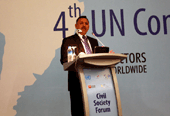Karki: CSOs will work “on our own programmes for action”
Published on Wed, 2011-05-11 07:42
Source: LDC Watch The fact “that poor and marginalised people in LDCs have gained little from the past decade” is a “bitter reality” that made the civil society work on its “own programmes for action beyond” the United Nations Fourth Conference on Least Developed Contries (UNLDC-IV), said Arjun Karki, international coordinator of LDC Watch. As chair and spokesperson of the UNLDC-IVA Civil Society Forum, Karki recalled this Monday that the poorest countries “are having to bear the brunt of new crises of food, water, climate change and global finance, even though they have not caused these crises”. This is a summary of Karki’s speech:
It is my great pleasure and honour to warmly welcome you to this Civil Society Forum of the Fourth United Nations Conference on the LDCs. I thank you for your commitment, solidarity and enthusiasm to be with us today, at this critical juncture. Over the next four days we will be adopting the new Programme of Action for the betterment of the world’s poorest, most vulnerable and marginalised citizens –and we are talking about over 900 million of our fellow human beings!
Let us remind ourselves that the important and indispensable contribution of civil society to the LDC-IV process has been recognised in the General Assembly resolution 63/227. This has set the starting point for our work. We have been engaged in an intense and extensive process of mobilising and consolidating peoples’ will, strength and voices with regional consultations in Africa, Asia and the Pacific, and dialogues in Korea, the USA and the UK.
What we learnt from this engagement process is the bitter reality that poor and marginalised people in LDCs have gained little from the past decade. To the contrary, they are having to bear the brunt of new crises of food, water, climate change and global finance, even though they have not caused these crises. We cannot keep witnessing the number of LDCs grow, as has been the case since 1971 - from 24 to 48 today. We must do better here in Istanbul.
We are grateful for the support from governments, especially the Turkish government, and from the UN that has allowed such a diverse and skilled range of civil society representatives to be assembled here today. The energy and enthusiasm amongst the people here at the Civil Society Forum is amazing, including women’s movements, trade unions, youth movements, farmers, intellectuals, NGOs and grassroots organisations. We will harness these skills and the tremendous energy over this coming week.
We will work on our own programmes for action, recognising that real change cannot happen without the ownership and participation of people across society. We will prepare our plans for action beyond this conference, to engage and inform the public, strengthen our work and hold governments to account for effective implementation of the Istanbul Programme of Action.
When we talk about a new and bold progressive approach to development, we mean an urgent and radical shift from the current development paradigm to genuine pro-people development. We need an international development architecture that supports lifting LDC peoples out of the continuing misery of the vicious cycle of poverty and vulnerability, and puts people and the planet before profit.
We have been making this clarion call for a new and bold agenda throughout the LDC-IV preparatory process. I would like to take the opportunity to introduce our global civil society report “Towards a World without LDCs” which carries urgent policy recommendations. It mirrors peoples’ perspectives and alternatives to poverty eradication and sustainable development that should shape the LDC agenda. The report constitutes a global civil society voice – spanning the South and the North. It underscores the key message that the dominant development paradigm must change NOW. The past approaches have failed the LDC’s citizens. We are calling for an agenda to build a world without LDCs!
In closing, I take great pleasure in presenting this report to you, as distinguished global leaders, on behalf of the LDC-IV Civil Society Steering Committee and participants here at the Civil Society Forum. Finally, I would like to extend sincere thanks to the entire team of our host counterpart, the Doctors Worldwide, as well as to our colleagues at the OHRLLS, in particular, Under-Secretary-General Cheick Sidi Diarra for providing their steadfast support and co-operation in bringing together this historic LDC-IV Civil Society Forum.
Thank you very much. |
SUSCRIBE TO OUR NEWSLETTER



